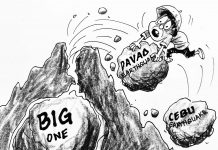In the past weeks, the rain has been just like a lingering guest who refuses to go away. It comes out for a while—long enough for our clothes to dry in the sun and for us to indulge ourselves in the futile hope of blue skies—before bursting its way back in, pouring its heart out as if it never went away in the first place. And this is no soap opera of the seasons; this is the daily or weekly trend for now.
I ceased to track the weather report because, hello, what’s the use? Rain or shine according to PAGASA, we all understand how this game is played: a balmy, sweaty morning ruined by an intense afternoon rainstorm so heavy it makes one wonder if ever did it rain during the summer season at all. Farmers rejoice, commuters rant, gutters overflow, and life continues on this damp rhythm that characterizes our lives. The question is, has it always been so, or have the rains become bolder and more relentless due to climate change?
The elders say no, that this is nothing new. “Ganyan na talaga ‘yan,” they say, brushing aside the unpredictability of the sky. But I will not settle for that that is all there is to it. Our grandparents and parents endured storms, naturally, but I don’t think they had rain dropping in such mad, inconstant ways, moistening areas that were once dry, and lingering in areas that were once stalwart. The last couple of years have been other, not only wetter but more draining like the air itself is working to maintain something it can no longer.
And science concurs. Adults have been saying for years that global warming isn’t simply a matter of temperature, but of moisture too. A warmer world is a more humid one, which translates to more torrential downpours and, ironically enough, longer, worse droughts in between. It’s a perverse, sad irony: parts of the nation are drying up in record drought, and we’re arguing about whether or not to begin cultivating gills. This is not our rainy season anymore, cozy and familiar. This is something other, something out of the way—something that turns roads into rivers overnight and renders flood maps useless within a few months.
And yet, who are we to grumble? We have learned to tolerate this. We splash through puddles shin-deep like it’s acceptable for us, we use umbrellas as much as we cherish our purse strings, and we’ve mastered the offense of mouthing curses against the rain in silence while inwardly admitting there’s nothing that can be done about it. We’re indeed tough, yes, but too shortsighted by it to understand the actual problem. Must we settle for merely controlling and begin questioning what is being done to our skies?
And even more so, what have we done to deserve such a prize? Our mountains are mined, our forests depleted, our cities sprawled out with no concern for the natural flow of water. We asphalt rice paddies, clog rivers with trash, and then get surprised when the rain has nowhere to go anymore. Perhaps the issue is not the rain. Perhaps it is us, bending nature to our will, rather than bending into nature with humility and planning.
If anything, the incessant rain should be demonstrating that the world is altering whether we agree with it or not. We can laugh at it, shake our heads in horror, and curse fate, but the fact of the matter is this: unless we begin to pay attention—unless we change our attitude toward our earth, air, and water—this is only going to continue to go downhill. And one day, when we’re hip-deep in floods which heretofore we had thought impossible, we might perhaps, just possibly, realize that the rain never was the problem. It was just the messenger.




